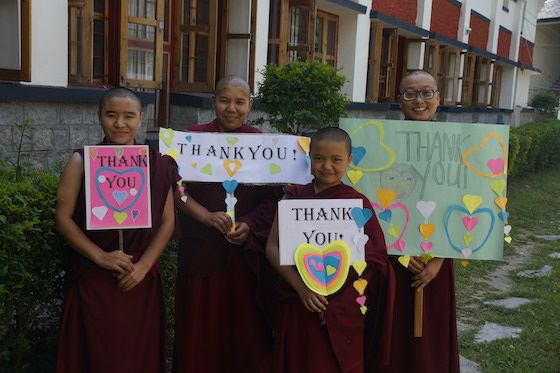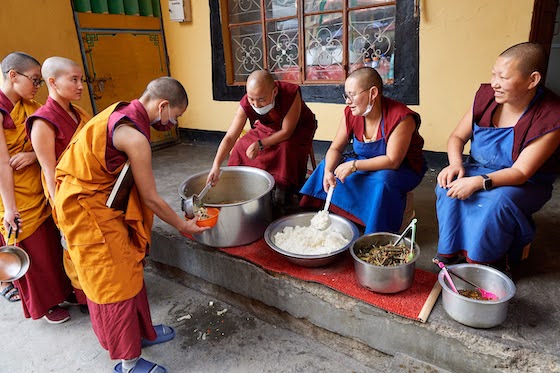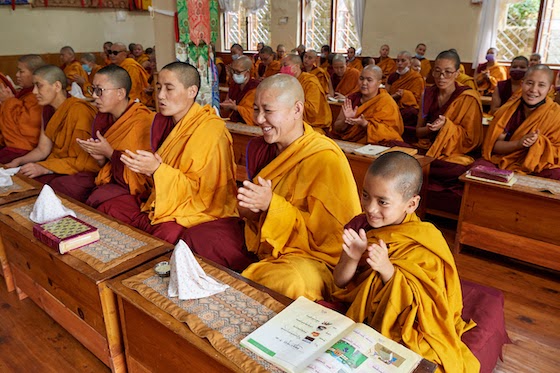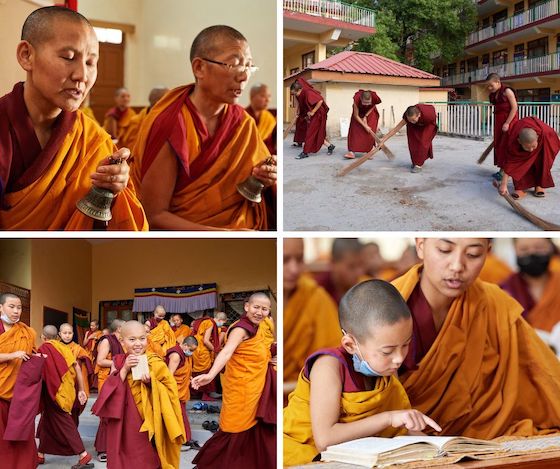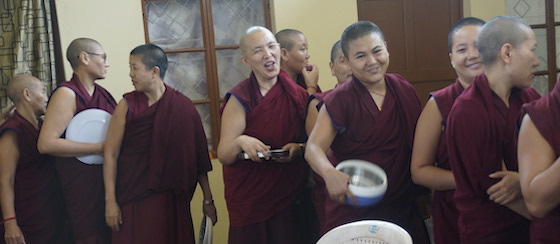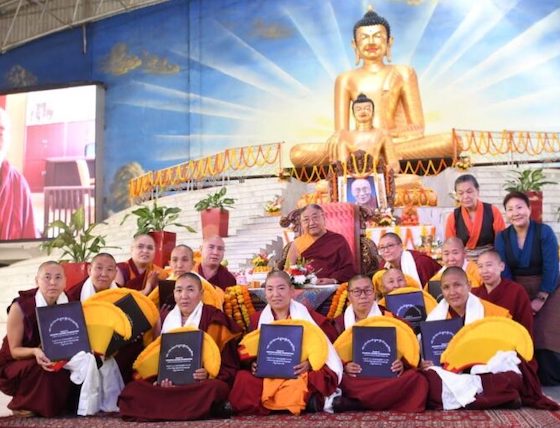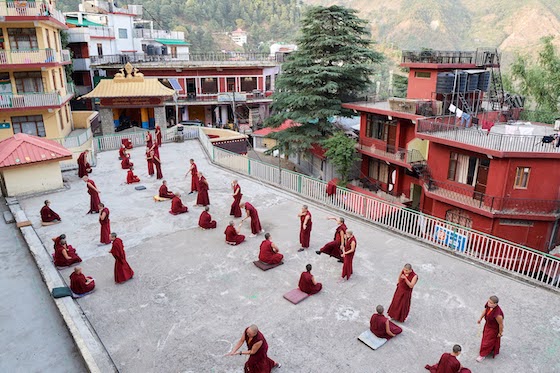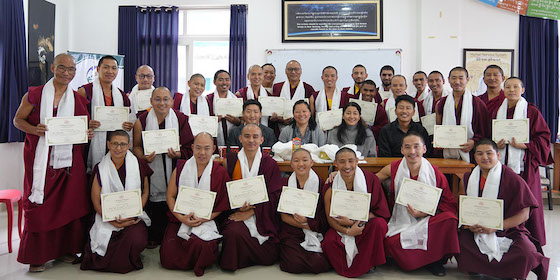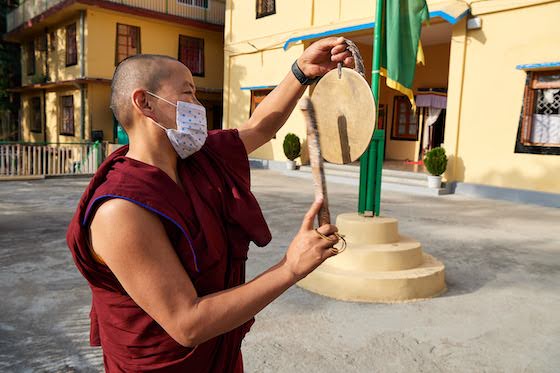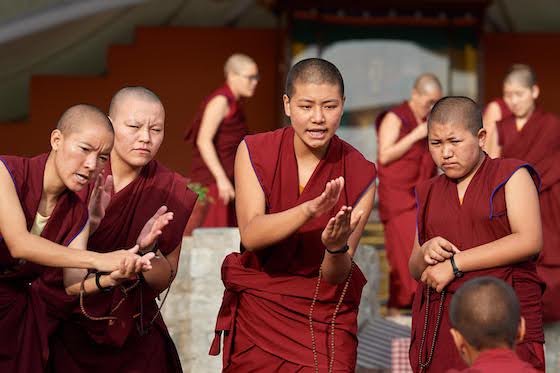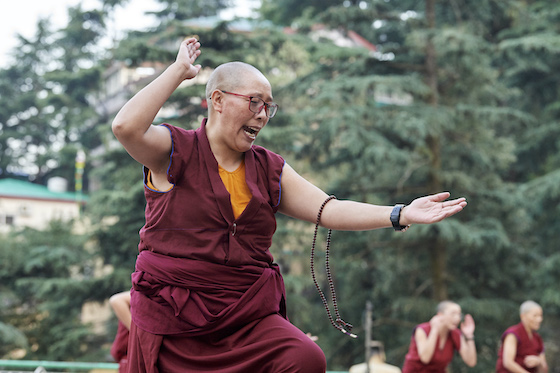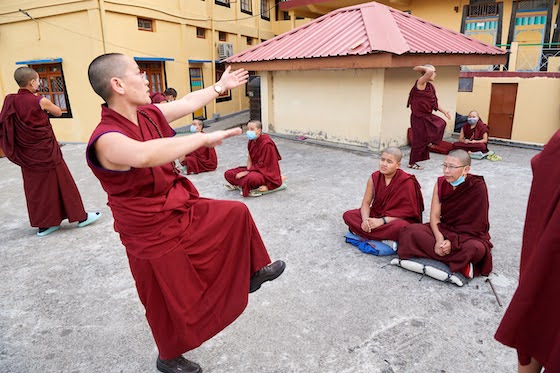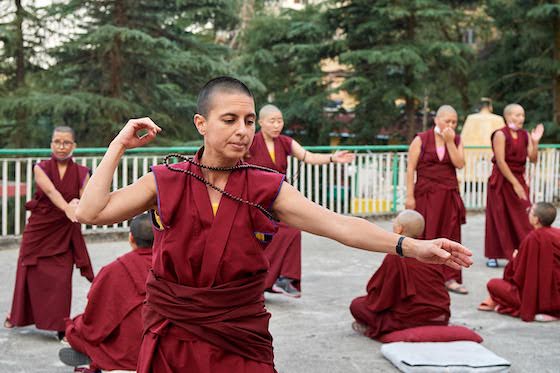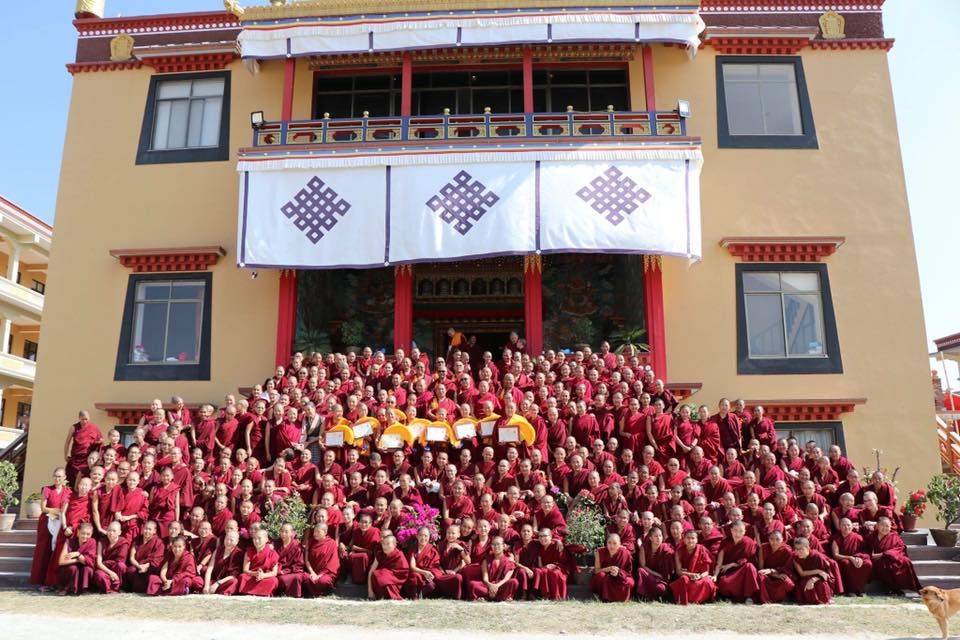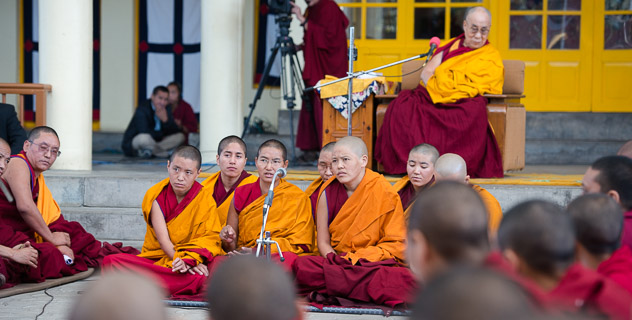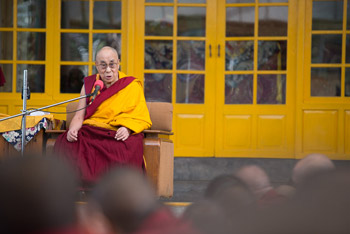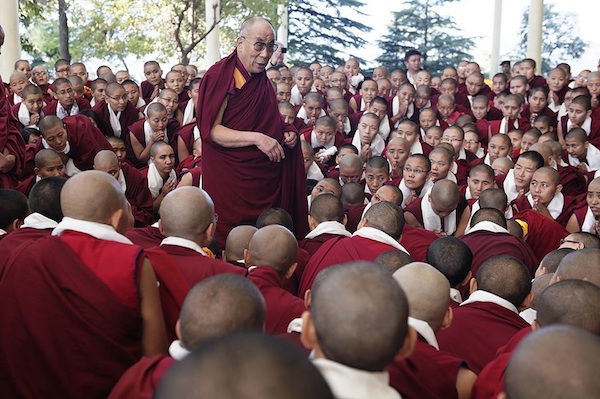We are very pleased to report that the debate courtyard expansion at Dolma Ling Nunnery and Institute is now complete. The improved courtyard provides an additional 2,500 square feet of covered area. With 60% more covered area than the old debate courtyard, all the nuns can have shelter as they practice daily monastic debate.
This big project was kindly funded by Tibetan Nuns Project donors. We are extremely grateful to the donors and the entire team for their hard work and dedication which has resulted in this elegant structure, totally in keeping with the original design.
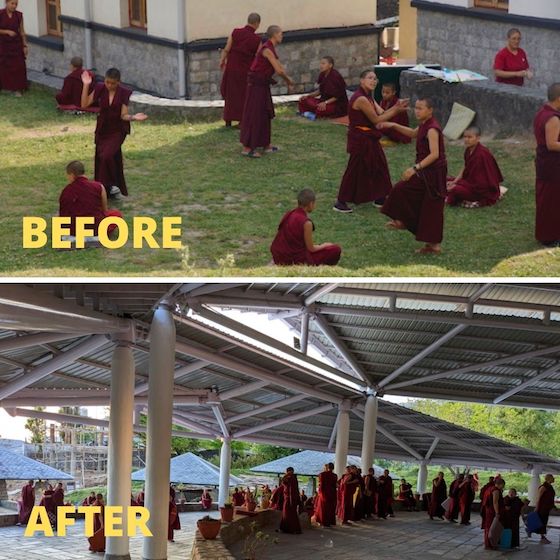
Before the debate courtyard was expanded there was not enough sheltered space for the nuns to debate. The improved courtyard has an additional 2,500 square feet of covered space along with other improvements such as sliding windows on the back and sides of the courtyard to prevent rain coming in.
The nuns are already using the courtyard for their daily debates. Monastic debate is of critical importance in traditional Tibetan Buddhist learning. Through debate, nuns test and consolidate their classroom learning. Without training and practice in debate they are unable to attain higher academic degrees such as the Geshema degree.
The Impact of the Improved Debate Courtyard
In the spring of 2022 the Tibetan Nuns Project launched a fundraising campaign to expand and improve the debate courtyard at Dolma Ling.
Over the years, the number of nuns at this large non-sectarian nunnery increased to over 260 nuns. The existing debate courtyard was too small and at least two-thirds of the paved area was open to the elements, so many nuns were forced to debate in the open under the hot sun. When it rained, as it does throughout the summer monsoon season, the unprotected space was unusable.

In an attempt to create more shelter the nuns have been stringing up tarps for years as they practice monastic debate. The area near Dharamsala experiences one of the heaviest monsoons in India and the sun is also fierce.
During their debate sessions, pairs of nuns spread out across the courtyards and even onto the adjoining grassy areas and steps. Some distance is required between the pairs or groups of challengers and responders. The aim of the project was to provide enough covered space to shelter the nuns as they do their daily practice of Tibetan monastic debate.
Work on the courtyard began in January 2022. The first phase involved protecting the upper courtyard from rain by enclosing the back and sides with sliding windows that can open to allow ventilation during the hot season.

Work on Phase 1 to improve the debate facilities at Dolma Ling. This part of the project involved enclosing the back and sides of the existing debate courtyard to prevent rain coming in.
The steel roofing over the upper section was also extended on all four sides to prevent rain from blowing in. Finally, an additional row of stone seating was added at the back and sides of the courtyard in front of the windows.
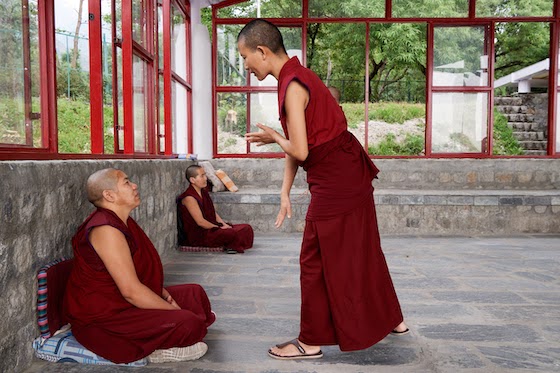
Nuns debating in front of the new windows at the back of the debate courtyard. Because of its reputation for providing excellent teachers and the best facilities for nuns to study, the number of nuns applying to join Dolma Ling has increased substantially. In 2022, 32 nuns joined the nunnery. Photo courtesy of Olivier Adam
In the early autumn of 2022, the Tibetan Nuns Project office in India signed a contract with the contractors for Phase 2 of the expansion project. On September 29th, the architect for the project came to assist the contractor with the positioning of the 8 new pillars for the extension roof.
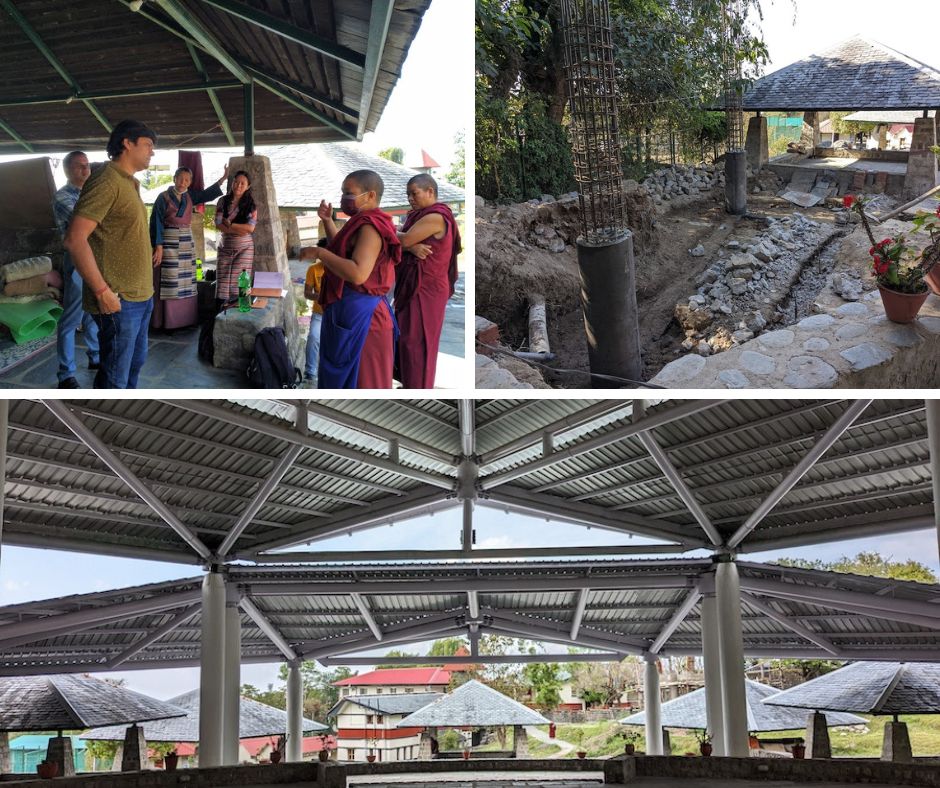
Phase 2 of the debate courtyard expansion began in October 2022 and involved excavating and building 8 more columns and extending the roof.
The nuns were very involved in the design of the new space and in discussions with the architect and engineers. Building specifications for this high-risk seismic zone were made and the extension complies with current building standards. In addition to the eight new columns, there had to be tie beams and two additional below-ground-level columns because they are building in previously filled land.
The Important of Tibetan Buddhist Debate
Dolma Ling is unique because it offers a 17-year curriculum of traditional Buddhist philosophy and debate, as well as modern courses in Tibetan language, English, basic mathematics, science and computer skills. Training in Buddhist debate, the extensively practised method for examining philosophical, moral and doctrinal issues, is an essential part of monastic education in the Tibetan tradition.
Until recently, Tibetan nuns did not have the opportunity to fully study and practise Tibetan Buddhist debate, a process that uses logical enquiry to build a deeper understanding of Buddhist philosophy. The Tibetan Nuns Project has worked hard to make this opportunity available to nuns by including debate as a core part of their education, which enables them to extend their use of logic and deepen their understanding of the arguments asserted in the texts they are studying.
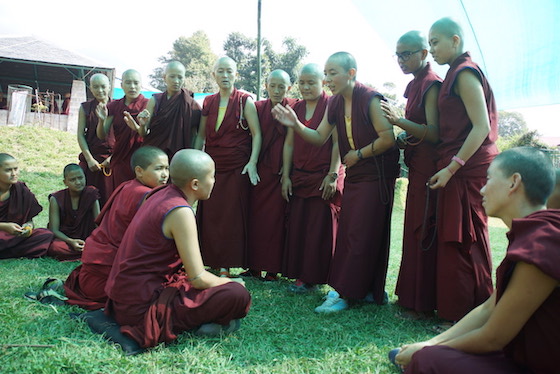
Before: Tibetan nuns practice debate on the grass under a makeshift shelter of netting. Since the Tibetan Nuns Project was founded in 1987, nuns are training in debate for the first time in the history of Tibet.
“Opening up education to the women, particularly in conjunction with training in debate, has been transformative for the nuns,” says Dr. Elizabeth Napper, US Founder and Board Chair of the Tibetan Nuns Project. “Not only have they been given access to the full intellectual richness of their Buddhist tradition but also, through debate, they have been trained to actively engage with it in a way that gives them confidence in their knowledge. Their body language changes from the traditional meekness of nuns to that of women who occupy space with confidence in their right to do so.”
The practice of debate takes many years to master fully and is critical to the nuns’ ability to assume roles as fully qualified teachers of their tradition.
We are very grateful to everyone who has contributed to providing this unique opportunity to build capacity and equality for the nuns, to help ensure that a centuries-old tradition of learning continues to expand to include more nuns, and to foster the dharma for future generations.
